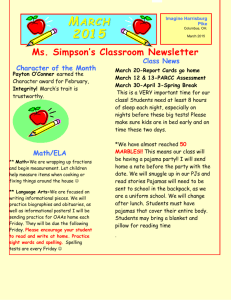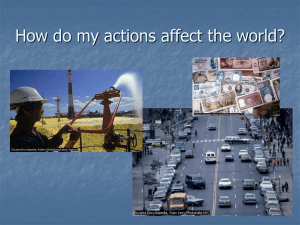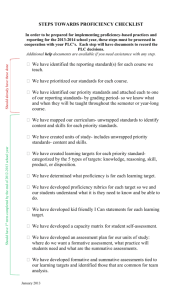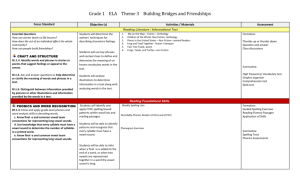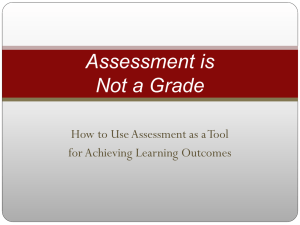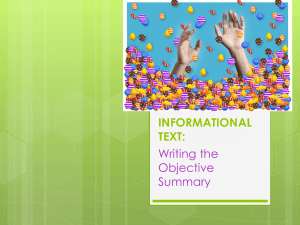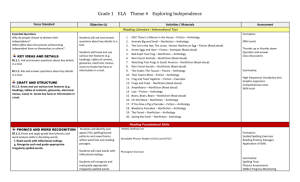Grade 1 ELA Theme 4 Exploring Independence
advertisement
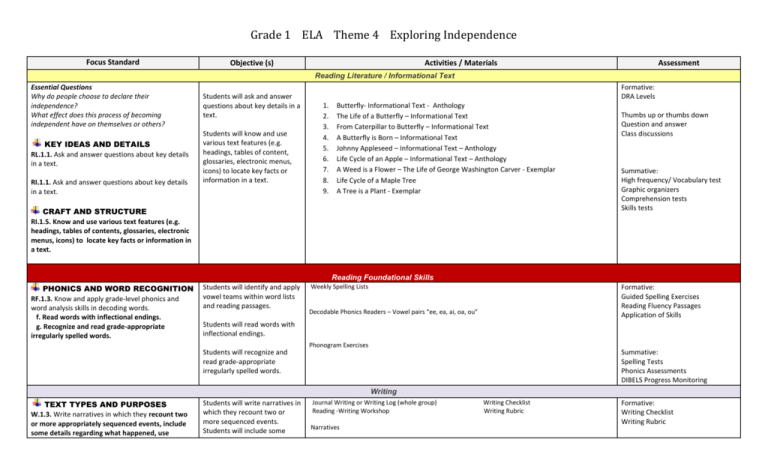
Grade 1 ELA Theme 4 Exploring Independence Focus Standard Objective (s) Activities / Materials Assessment Reading Literature / Informational Text Essential Questions Why do people choose to declare their independence? What effect does this process of becoming independent have on themselves or others? KEY IDEAS AND DETAILS RL.1.1. Ask and answer questions about key details in a text. RI.1.1. Ask and answer questions about key details in a text. Students will ask and answer questions about key details in a text. Students will know and use various text features (e.g. headings, tables of content, glossaries, electronic menus, icons) to locate key facts or information in a text. Formative: DRA Levels 1. 2. 3. 4. 5. 6. 7. 8. 9. Butterfly- Informational Text - Anthology The Life of a Butterfly – Informational Text From Caterpillar to Butterfly – Informational Text A Butterfly is Born – Informational Text Johnny Appleseed – Informational Text – Anthology Life Cycle of an Apple – Informational Text – Anthology A Weed is a Flower – The Life of George Washington Carver - Exemplar Life Cycle of a Maple Tree A Tree is a Plant - Exemplar CRAFT AND STRUCTURE RI.1.5. Know and use various text features (e.g. headings, tables of contents, glossaries, electronic menus, icons) to locate key facts or information in a text. Thumbs up or thumbs down Question and answer Class discussions Summative: High frequency/ Vocabulary test Graphic organizers Comprehension tests Skills tests Reading Foundational Skills PHONICS AND WORD RECOGNITION RF.1.3. Know and apply grade-level phonics and word analysis skills in decoding words. f. Read words with inflectional endings. g. Recognize and read grade-appropriate irregularly spelled words. Students will identify and apply vowel teams within word lists and reading passages. Weekly Spelling Lists Formative: Guided Spelling Exercises Reading Fluency Passages Application of Skills Decodable Phonics Readers – Vowel pairs “ee, ea, ai, oa, ou” Students will read words with inflectional endings. Students will recognize and read grade-appropriate irregularly spelled words. Phonogram Exercises Summative: Spelling Tests Phonics Assessments DIBELS Progress Monitoring Writing TEXT TYPES AND PURPOSES W.1.3. Write narratives in which they recount two or more appropriately sequenced events, include some details regarding what happened, use Students will write narratives in which they recount two or more sequenced events. Students will include some Journal Writing or Writing Log (whole group) Reading -Writing Workshop Narratives Writing Checklist Writing Rubric Formative: Writing Checklist Writing Rubric Grade 1 ELA Theme 4 Exploring Independence temporal words to signal event order, and provide some sense of closure. details regarding what happened, use temporal words to signal order, and provide some sense of closure. Graphic Organizers Revising Checklist Summative: Graphic Organizers Revising Checklist Writing Samples/ Rubric: Writing Samples/Rubric Language VOCABULARY ACQUISTION AND USE L.1.6. Use words and phrases acquired through conversations, reading and being read to, and responding to texts, including using frequently occurring conjunctions to signal simple relationships (e.g. because). Students will use frequently occurring conjunctions, such as: and; but; because to signal simple relationships. High Frequency Word Lists Spelling Units Writing Prompts Formative: Individual Observation Journal Writing Summative: Narratives High Frequency Word Tests Spelling Unit Tests Speaking and Listening PRESENTATION OF KNOWLEDGE AND IDEAS SL.1.5. Add drawings or other visual displays to descriptions when appropriate to clarify ideas, thoughts, and feelings. Students will engage in collaborative conversations about grade-appropriate topics and texts. Students will add drawings or other visual displays when appropriate. The students will engage in small group discussions (listening and speaking centers) about the stories and will actively engage in question asking. Formative: Daily discussions on story topics. Students will describe the people, places, and events that are in the stories with clear ideas and feelings. They will express their thoughts and feelings about the stories. Observing students’ active engagement in small groups Summative: Comprehension tests at the end of the theme.
